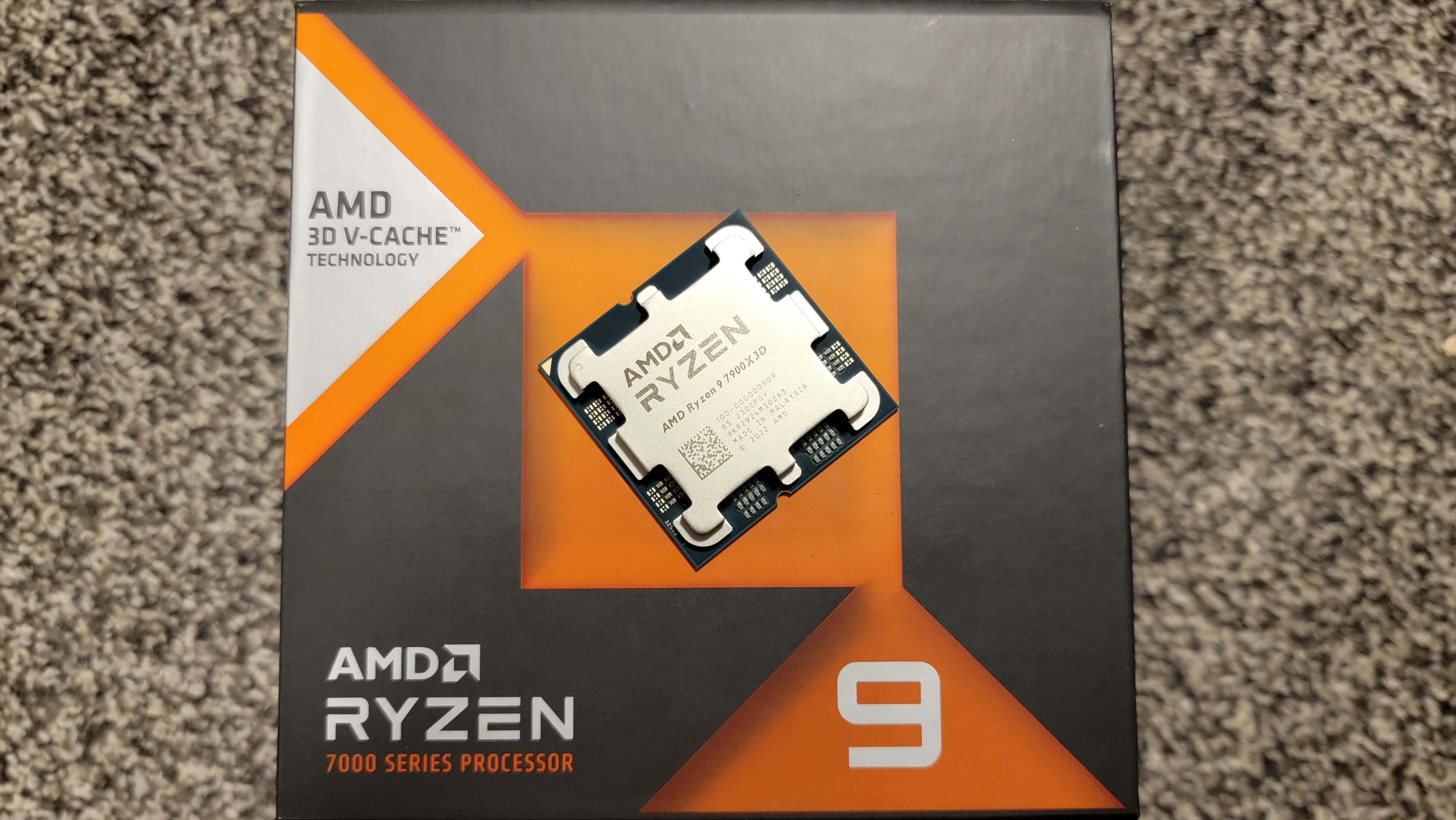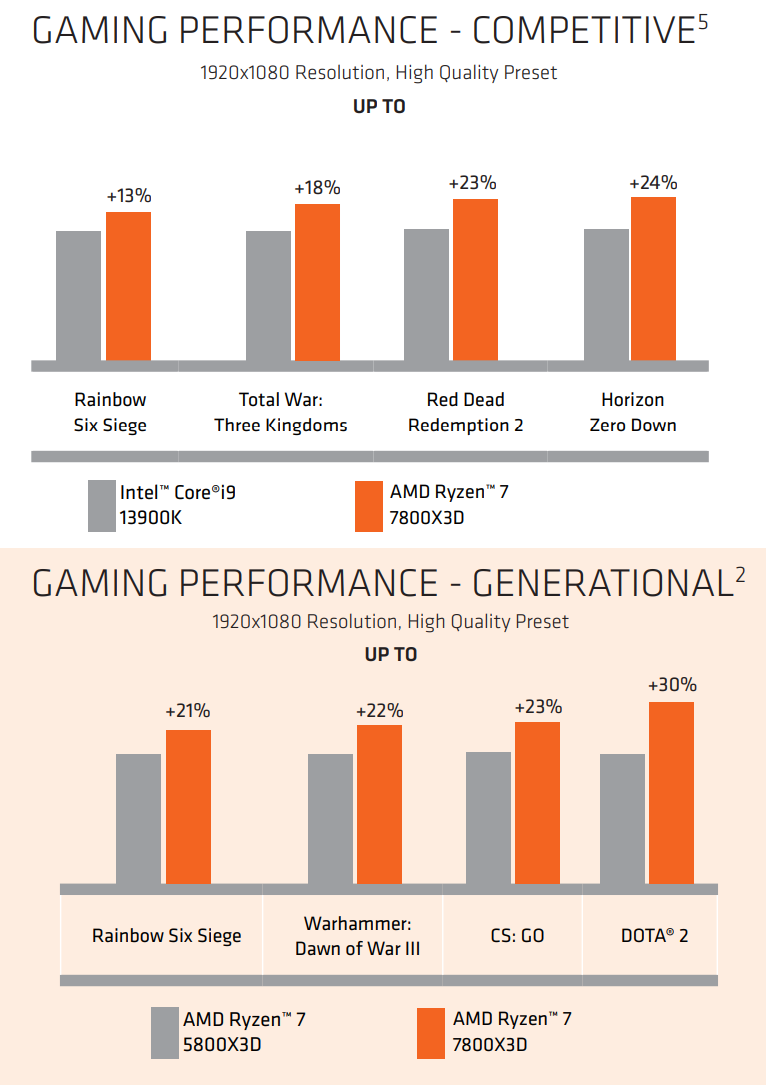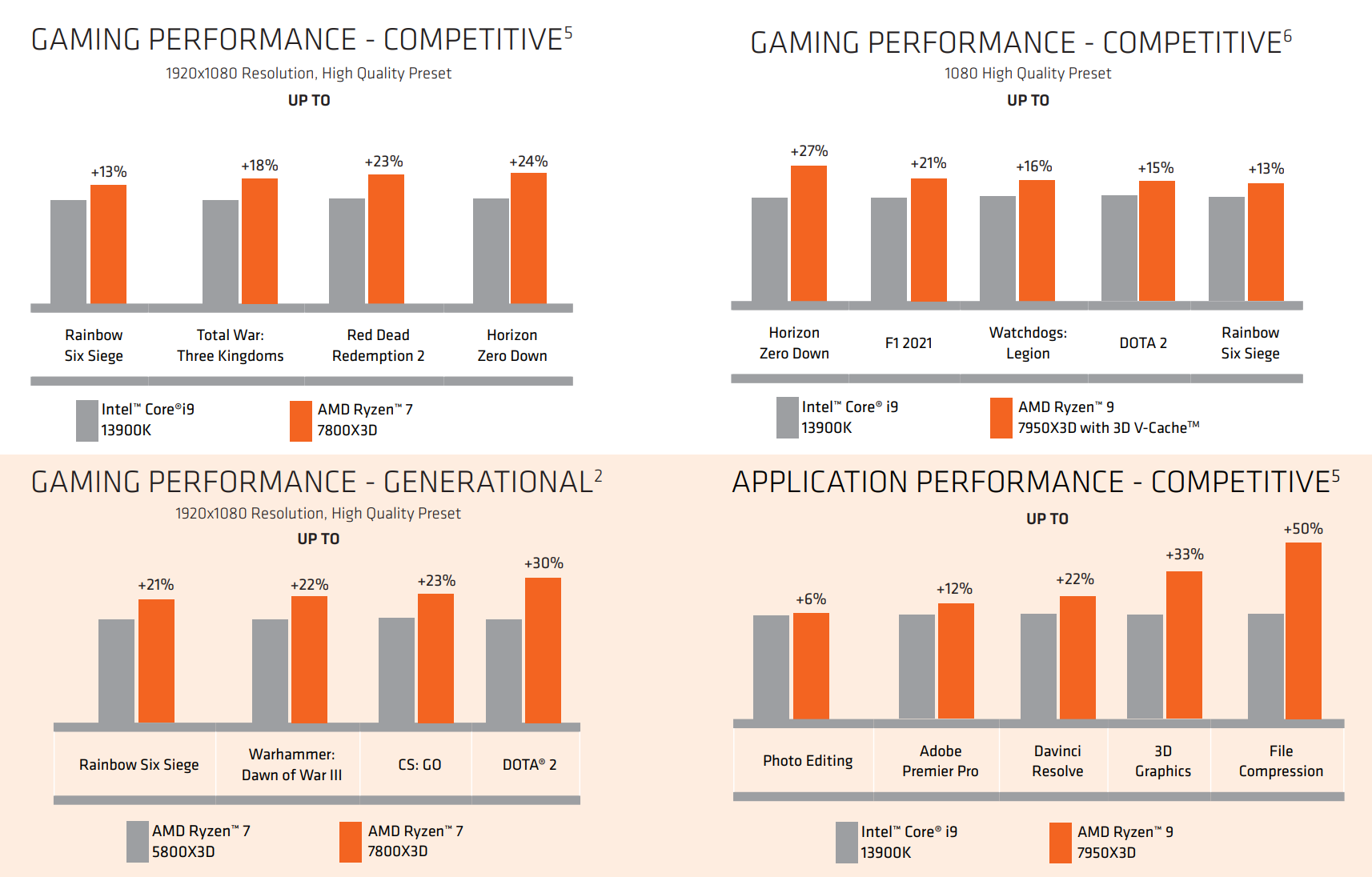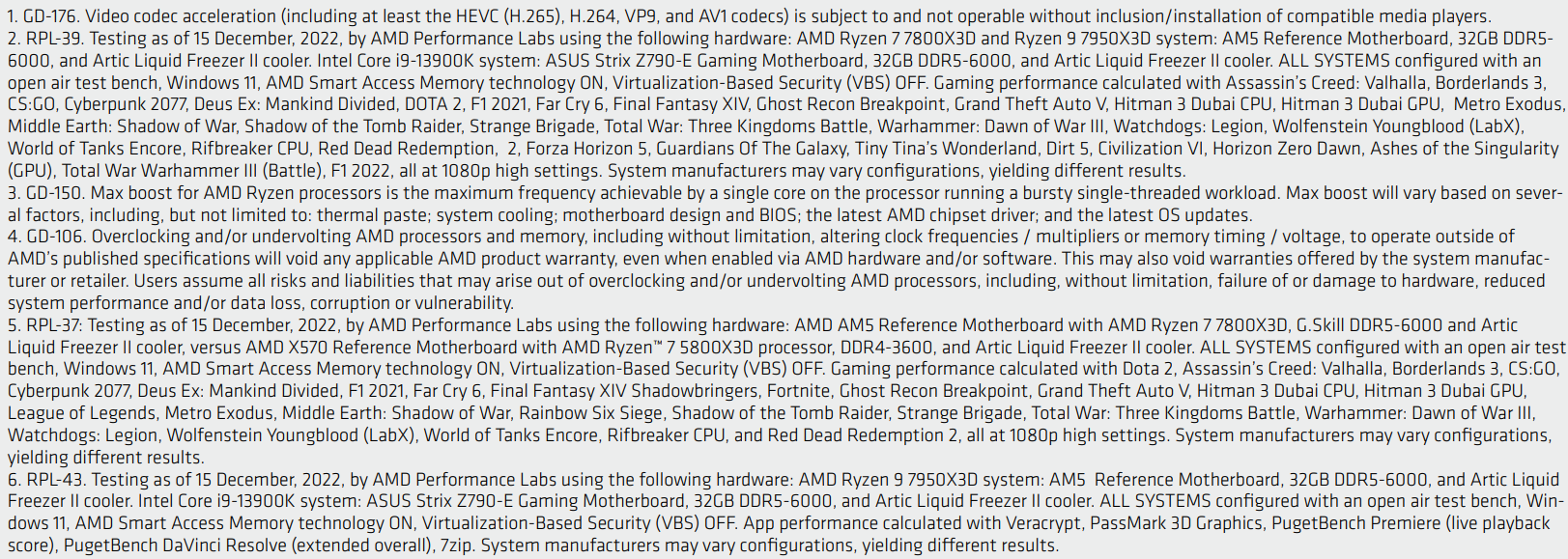AMD's First Official Ryzen 7 7800X3D Gaming Benchmarks vs Core i9-13900K, Up To 24% Faster
Here comes the pain.

AMD has finally shared its own official gaming benchmarks of the hotly-anticipated $449 Ryzen 7 7800X3D going toe-to-toe with Intel's flagship $589 Core i9-13900K and winning by an average of 20%, and up to 24% in one title - but for $150 less. The new benchmarks also give us a limited comparison of the Ryzen 7 7800X3D with the Ryzen 9 7950X3D, too, implying that the less expensive chip offers nearly the same level of gaming performance as the pricey flagship - but for $250 less.
AMD has already released its flagship 3D V-Cache-powered $699 Ryzen 9 7950X3D to critical acclaim, with the new chip taking the crown as the best CPU for gaming while maintaining a commanding presence on our CPU benchmark hierarchy. The company also low-key launched the $599 Ryzen 9 7900X3D without sampling press (you can see our review at the link).
However, AMD has held back launching its $449 eight-core Ryzen 7 7800X3D chips until April and has been stingy with the benchmarks, having only compared it to the previous-gen Ryzen 7 5800X3D in gaming and not the entirely more relevant Core i9-13900K and Ryzen 9 7950X3D.
That might be because the 7800X3D is too good for its own good: the eight-core, 16-thread Ryzen 7 7800X3D stands out as the go-to model for gamers with this generation, so it'll be the big volume seller. AMD’s reps tell us the 78000X3D will offer the lion’s share of 3D V-Cache’s gaming performance, but at a much more affordable price point than the other X3D models. So naturally, if the 7800X3D offers nearly the same level of gaming performance for $250 less than the flagship, that won't leave much reason to buy the pricier models once the 7800X3D arrives.
We’ll have to see things pan out in our own benchmark testing, but it looks like the Ryzen 7 7800X3D will take the lead over Intel’s Raptor Lake when it arrives next month. AMD's new benchmarks below certainly paint that picture, too.

As with all vendor-provided benchmarks, take these with a grain of salt. (We've included the test notes below with the test setup particulars, but the '5' footnote doesn't list the 13900K details; those are in the '2' footnote).
We've seen the bottom half of the chart before — it compares the Ryzen 7 7800X3D to the Ryzen 7 5800X3D. But the top half is new with four gaming benchmarks versus the Core i9-13900K.
AMD claims the Ryzen 7 7800X3D is 20% faster, on average, in gaming than the Core i9-13900K across these gaming benchmarks. The Ryzen 7 7800X3D carves out a 24% win in Horizon Zero Dawn, a 23% win in Red Dead Redemption 2, an 18% win in Total War: Three Kingdoms, and a 13% win in Rainbow Six Siege.
This is a limited selection of games, and they tend to be the types of titles that benefit from the gaming benefits of the 3D V-Cache, whereas some games don't benefit quite as much. Conversely, some other games benefit from the tech far more, so this list isn't entirely skewed.

The zoomed-out version includes the Ryzen 9 7950X3D vs Core i9-13900K comparison. Here we see that AMD tested two of the same games against the Core i9-13900K with both the 7950X3D and the 7800X3D, which helps us make at least a small comparison between the two AMD chips.
Get Tom's Hardware's best news and in-depth reviews, straight to your inbox.
In Horizon Zero Dawn (not "down," as listed in the slide), we can see that the 7800X3D is a mere 3% slower than the 7950X3D, whereas the two chips tie in Rainbow Six Seige.
Yes, two benchmarks don't give us much to work with, but it certainly implies that the 7800X3D will do just what we've suspected — provide within 5% of the performance of the 7950X3D, but for $250 less. We'll have to see how that pans out across a larger gamut of gaming benchmarks in our review, of course.
Thoughts
| Price | Cores / Threads (P+E) | P-Core Base / Boost Clock (GHz) | Cache (L2/L3) | TDP / PBP / MTP | |
|---|---|---|---|---|---|
| Ryzen 9 7950X3D | $699 | 16 / 32 | 4.2 / 5.7 | 144MB (16+128) | 120W / 162W |
| Ryzen 9 7900X3D | $599 | 12 / 24 | 4.4 / 5.6 | 140MB (12+128) | 120W / 162W |
| Ryzen 7 7800X3D | $449 | 8 /16 | 4.2 / 5.0 | 104MB (8+96) | 120W / 162W |
| Ryzen 7 5800X3D | $348 | 8 /16 | 3.4 / 4.5 | 104MB (8+96) | 105W |
AMD's Ryzen 7 7800X3D has plenty of promise, and we're sure that it will be this generation's Ryzen 7 5800X3D — the overwhelming choice for gamers that are solely interested in gaming.
The 12-core and 16-core Ryzen 7000X3D bring 3D V-Cache tech to AMD's multi-compute-chiplet processors for the first time (deep dive here), but they require special handling via AMD's drivers to ensure the highest performance, while the Ryzen 7 7800X3D has a single chiplet and will operate more like a traditional CPU. AMD's special driver sauce does a great job of delivering exceptional gaming performance for multi-chiplet designs without user intervention, but the 7800X3D will have a simpler plug-and-play implementation.
AMD was also uncharacteristically silent about the 12-core Ryzen 9 7900X3D, but for different reasons. AMD shared zero official benchmarks for the 7900X3D and didn't sample it to the press. We can see why; in our Ryzen 9 7900X3D review, we saw that the price-to-performance ratio was less than inspiring. If you're buying on the high end, there's no reason not to plunk down the comparatively small extra amount to get the flagship Ryzen 9 7950X3D.
In contrast, it appears that the Ryzen 7 7800X3D will be the complete opposite; this chip could severely cannibalize the sales of AMD's own higher-end models. We'll see soon enough, the Ryzen 7 7800X3D comes to market on April 6, 2023, and you can be sure that we'll have our review published in the same time frame.


Paul Alcorn is the Editor-in-Chief for Tom's Hardware US. He also writes news and reviews on CPUs, storage, and enterprise hardware.
-
TerryLaze Lol, did they actually not even know what game they are testing or is there really a horizon zero down?!Reply
Also having the 'up to' disclaimer on every pic probably means that they took the max FPS and not the avg.
-
TerryLaze Also, careful guys, undervolting has become somewhat of a fad lately but you are voiding your warranty.Reply
-
Amdlova I build a 5700G with 4133mhz ram. One year after the system can't do even 3600 mhz. Unstable frozen in windows changed the memory old sticks 2666mhz works perfectly.Reply
How fast these new amd cpu will have problem 😡 -
SunMaster ReplyKyaraM said:Yeah, right. And in a 50 games bench it will be maybe 1%, as last time.
It's always nice to get the facts on the table. Luckily we have you, the resident AMD-hater, to spew nonsense and cheer us up while we wait. -
Roland Of Gilead Ah, lads. This is getting a bit long in the tooth. The "Doesn't work in all games" bla bla argument.Reply
Whilst it may not work on all games, it seems to work well on newer game engines. At least that's what I can see. I guess if you go back far enough to games that simply wouldn't take advantage of it then you could really say that. But a lot of newer games do make use of it, and performance/fps is increased. It's plain to see that this tech works. Denying it doesn't make it bad, because you think so.
Where are Intel with their Foveros tech? Ill tell you where, two steps behind! The X3d cache will be used more and more by game developers. as AMD/Publishers can push games that do really well with X3d CPU's. Maybe Intel can bring Foveros or variant to desktop CPU's, but right now they don't.
Don't get me wrong, I'm a fan of both Intel and AMD. I have systems with both. They all do what I need them to do.
This is a great time for CPUs/Innovation. It's all good for the consumer. We get choice, and the choices are really good. -
KyaraM Reply
So not taking AMD or any other company at face value is spouting nonsense and hating now? lmao. Btw, the test my "nonsense" is based on:SunMaster said:It's always nice to get the facts on the table. Luckily we have you, the resident AMD-hater, to spew nonsense and cheer us up while we wait.
https://www.techspot.com/review/2450-ryzen-5800x3D-vs-core-i9-12900k/
Previous gen equivalent CPUs against each other. 1% overall lead for the 5800X3D. Any more questions?
Oh, and, just for info. I don't hate AMD and have in fact a laptop with an AMD CPU I'm sitting at just now. I'm just not dumb enough to believe every word any company says. And it doesn't matter which one, at that. The moment I believe a claim is when I see it backed up by actual benchmarks, not some company slides. -
nerdvous Without wanting to get involved in a platform argument, my perspective is that this CPU is probably going to offer very good gaming performance for relatively low cost and power draw, making it an attractive proposition for gamers to build a system around. This is good for everyone, because it will push Intel to step up their game for the next generation. As consumers we all win.Reply -
-Fran- As a 5800X3D owner*, this doesn't even tell half the story on how much the VCache makes a difference in the gaming experience.Reply
Well, at least for VR, which is my use case for such a CPU. For general purpose I take more cores (when within strike distance of performance) over cache.
Looking forward to the official reviews to get the real numbers XD
Regards. -
SunMaster ReplyKyaraM said:So not taking AMD or any other company at face value is spouting nonsense and hating now? lmao. Btw, the test my "nonsense" is based on:
The nonsense part is where you assume. None of us do know. On the other hand I could take a comparison of the 5800x3d and 13900k -
a game where the 13900K beat the 5800x3d - and AMD claims the 7800x3d is 23% faster.
I'm sure you, as per usual, know better.